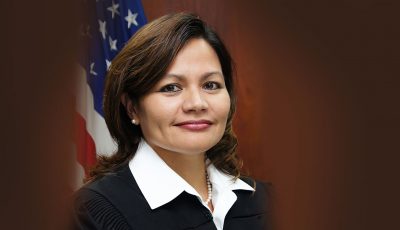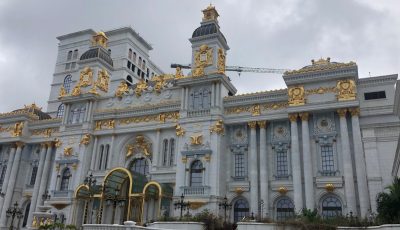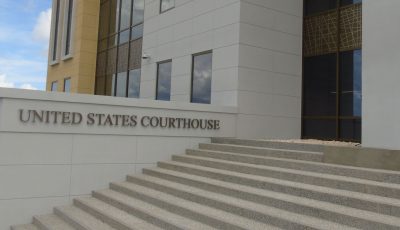Larson testifies in Quichocho lawsuit vs casino law
»‘Delays only hurt the impact of bringing in massive revenue’
Finance Secretary Larrisa Larson took the witness stand in Superior Court last Friday after attorney Ramon K. Quichocho summoned her in connection with his request for preliminary injunction in his lawsuit against the 2-month-old casino law.
Associate Judge David A. Wiseman later placed Quichocho’s motion under advisement.
Larson pointed out that she could not answer many of the questions Quichocho raised because she is not a lawyer and that she did not draft the government’s opposition to his motion.
Assistant attorneys general David Lochabay and Reena Patel, counsels for the CNMI government and Gov. Eloy S. Inos respectively, objected to many of the questions Quichocho aske Larson, describing them as irrelevant and immaterial. Assistant attorney general Teresita Sablan also appeared for Inos.
Larson said the $2-million non-refundable application fees by two casino license applicants have been placed under the Lottery Commission and held in an account under Finance’s custody. She said the money is still in the account and that no other payment by the applicants has been made.
In an interview after the hearing, Larson said one of the biggest obligations facing the government and impacting its ability to move forward and increase agencies’ budget is the Retirement Fund payment under the Betty Johnson’s class action settlement.
“This year we have to pay $25 million and that’s still something that we’re working on. We’ve been current with our payment, but it is a struggle to have to come up with that figure,” Larson said.
With each year that passes, the government has to worry about where it is going to come up with more and more money, she said.
“So we’re cutting our operational costs,” Larson said. “But we have to do it because of this obligation. And with each and every year as the obligation gets bigger, the impact on us is gonna get even more significant.”
Larson underscored the importance of having serious investments come in such as the casino.
“Whatever it might be, we need revenue,” she said.
The administration, Larson said, is doing its best not to touch the personnel. “But should something like this happen, when we don’t get revenue, we might have to get to that point because of the amount we have to pay the Retirement Fund.”
Delays like the temporary restraining order that Quichocho is seeking would only hurt that effort to bring in more revenue. The government, she pointed out, needs this kind of cash infusion.
“We just don’t need a few dollars here and a few dollars there. We need massive amount of money to make it through the next couple of years,” Larson said.
She disclosed that for this year alone, the government has to pay $25 million; $27 million for the next year; and $30 million for the following year. Larson said it’s very difficult for the government to make these payments.
Larson said they had difficulty in paying the initial $25 million. Since the amount gets higher, it’s a great concern.
“Each year we have to find resources,” she said.
Aside from the Johnson obligation, Larson said the government has numerous other obligations and that CUC billings is one of those.
In an interview after the hearing, Quichocho said the Commonwealth Casino Commission is the sole authority to expend the $2 million application fees.
“And now you have the Lottery Commission taking that role and entering into contracts expending that money not pursuant to the statute, in violation of the statute,” he said.
In his argument, Quichocho said his lawsuit showed a strong likelihood of success because two specific provisions of the casino law have been violated.
“The government is running out of control of expending illegally,” he said.
Quichocho said the court should send a strong message to the public that laws should be followed.
“Only if you are the Casino Commission, then you can spend that money,” said Quichocho, referring to the $2 million casino application.
The lawyer said the Lottery Commission has illegally expended public funds, collected pursuant to the casino law, to hire a casino investigator and a gaming consultant.
Quichocho said the court’s heart and mind should not be moved by the parade of fiscal ruins that was painted by the government’s lawyers in the event that defendants are stopped from illegally expending public funds collected pursuant to the casino law.
In the defendants’ arguments, Patel said that Quichocho has not met his burden for a preliminary injunction based on the evidence submitted.
Patel also pointed out that $50 million will be generated by the government in the casino’s first year of operation.
She said the government is in dire need of revenue. Delaying the process designed to create new revenue is in and of itself harmful to the public interest, Patel said.
“Time is of the essence,” she added.
Patel said the government needs new revenue to pay land compensation judgments, provide essential public services, and to meets is obligation to retirees.
Quichocho filed the lawsuit for himself and on behalf of the CNMI taxpayers.
The lawyer is suing Inos and co-defendants for alleged violation of the NMI Constitution, illegal expenditure of public funds, breach of fiduciary duty, and breach of trust.
Quichocho asked the court to issue a judgment declaring the casino law and any expenditure of public funds under that law as unconstitutional and unlawful.



























